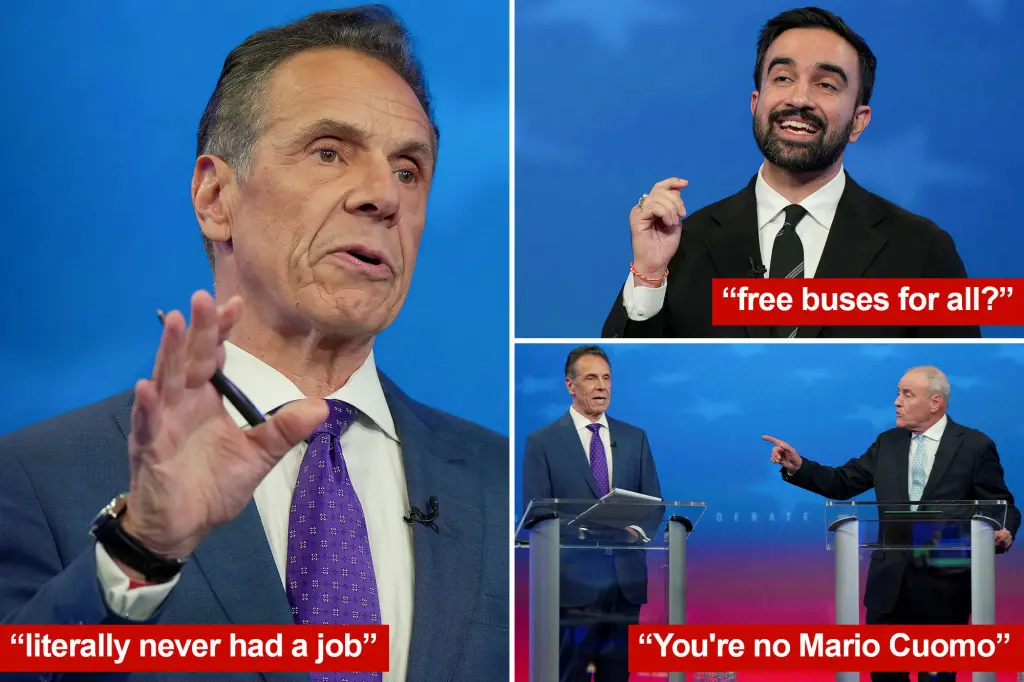New York Mayoral Debate: Fireworks, Zingers, and Policy Clashes
In a spirited two-hour mayoral debate that could shape New York City’s future, Democratic nominee Zohran Mamdani, Republican Curtis Sliwa, and independent Andrew Cuomo engaged in a heated exchange filled with personal attacks and policy disagreements. The debate, held at 30 Rockefeller Center and broadcast on WNBC, gave voters their first opportunity to see the three candidates who will appear on the November 4 ballot square off against one another. Throughout the evening, Sliwa and former Governor Cuomo frequently targeted frontrunner Mamdani, though their attacks weren’t always coordinated. The debate moderators repeatedly had to intervene, particularly when Sliwa exceeded his allotted time, creating a sometimes chaotic atmosphere as candidates talked over each other while attempting to make lasting impressions on voters.
The debate quickly turned personal when Cuomo launched an early attack on Mamdani’s qualifications, declaring that the 33-year-old Queens assemblyman “literally has never had a job” beyond interning for his mother. Cuomo positioned his decades of political experience against Mamdani’s relatively brief time in elected office, ominously warning that “if you don’t know what you’re doing people could die.” Mamdani countered by referencing Cuomo’s controversial handling of nursing homes during the COVID-19 pandemic, asking why voters would “turn back to the governor who sent seniors to their deaths.” This exchange set the tone for an evening where personal histories and leadership credentials became central themes, with each candidate attempting to frame their background as uniquely qualifying them to lead America’s largest city during challenging times.
One of the most contentious exchanges centered around prostitution policy, highlighting significant ideological differences between the candidates. When questioned about quality-of-life issues, both Cuomo and Sliwa targeted Mamdani’s position on sex work. Though Mamdani claimed, “I am not nor have I ever called for the legalization of prostitution,” his opponents noted he co-sponsors a bill in Albany that would decriminalize sex work. Cuomo advocated for traditional law enforcement approaches, stating bluntly, “You have to enforce the law, it’s illegal,” and proposed increasing police presence in affected areas. Sliwa offered a middle position, suggesting enforcement should focus on “the madams and the pimps” rather than sex workers themselves. This debate segment revealed deeper philosophical divides about criminal justice reform, enforcement priorities, and the balance between compassion and public order that would likely shape each candidate’s approach to governing.
When asked about funding his ambitious policy agenda of free buses, universal childcare, and rent freezes for stabilized units, Mamdani struggled to provide concrete answers. Rather than directly addressing how he would pay for these initiatives, he pivoted to discussing his primary victory and vaguely referenced having “a plan to save money.” This moment highlighted one of the central questions surrounding his candidacy: whether his progressive vision for New York is financially viable. The exchange also revealed the candidates’ differing approaches to fiscal policy, with Cuomo and Sliwa positioning themselves as more fiscally pragmatic alternatives to Mamdani’s expansive social programs. Throughout the debate, Mamdani framed his policy proposals as necessary investments in affordability and equity, while his opponents characterized them as unrealistic promises that the city cannot afford.
In an unexpected turn, a seemingly straightforward question about parade participation sparked controversy that touched on cultural identity and New York’s historical monuments. When Sliwa asked whether Mamdani would protect Christopher Columbus statues, referencing an incident where Mamdani allegedly gave the middle finger to a Columbus monument in Astoria, the Democratic nominee deflected, saying, “My focus is on affordability. I’m not thinking about statues.” Cuomo joined the attack with an Italian exclamation of “Disgraziato!” The exchange highlighted how cultural issues remain flashpoints in New York politics, with monuments and parades serving as proxies for deeper debates about history, heritage, and representation in the city’s diverse communities. The moderators quickly moved to lighter territory, asking candidates about their bagel preferences before concluding the debate.
Throughout the evening, Curtis Sliwa provided memorable moments with his colorful commentary and personal anecdotes that frequently deviated from policy substance. Without his trademark red Guardian Angels beret, Sliwa nonetheless maintained his distinctive presence, telling Cuomo, “I knew Mario Cuomo, you’re no Mario Cuomo,” referencing the former governor’s father. Sliwa shared personal stories about avoiding yellow cabs since being shot in one by mobsters in the 1970s and his use of medical marijuana to treat Crohn’s disease resulting from that shooting. His unpredictable contributions included accidentally responding to questions directed at other candidates and name-dropping both his ex-wife, Queens DA Melinda Katz, and former Republican Governor George Pataki. While these moments provided levity, they also underscored the stark stylistic differences between the candidates competing to lead New York City through its next chapter, leaving voters with clear contrasts in both personality and policy vision heading toward the November election.


